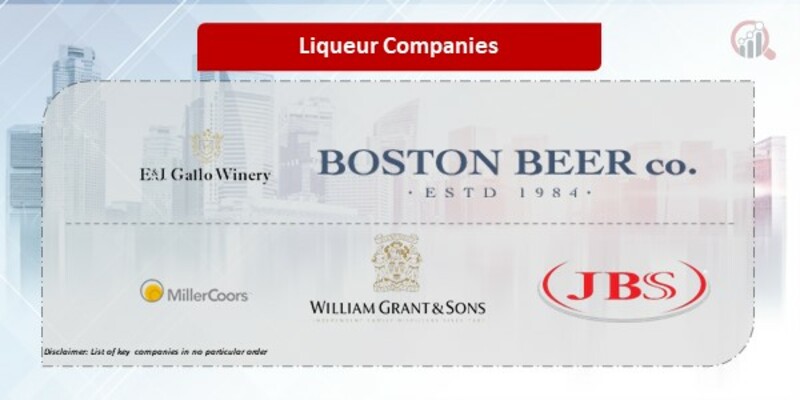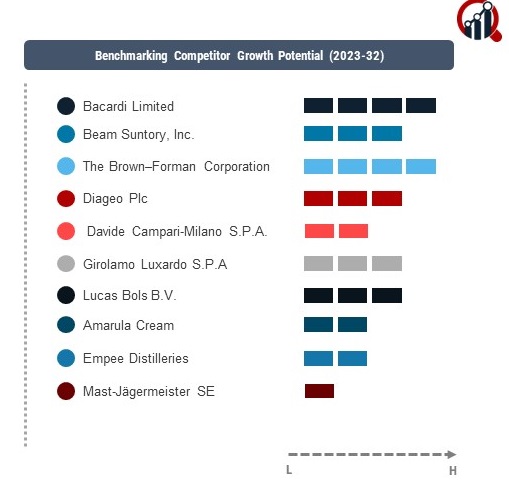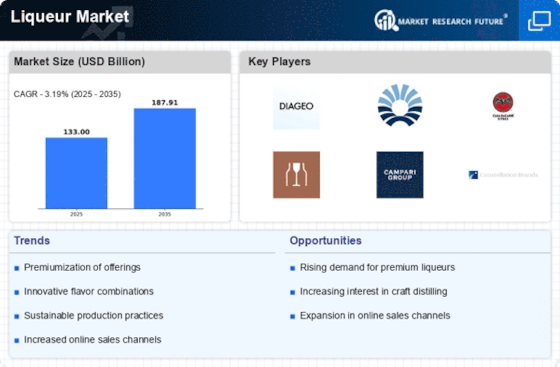Top Industry Leaders in the Liqueur Market

Strategies Adopted by Liqueur Key Players
The Competitive Landscape of the Liqueur Market is marked by a blend of established industry leaders and emerging players, each striving to capitalize on the global demand for diverse and innovative alcoholic beverages. As of 2023, key players have solidified their positions through strategic initiatives, contributing significantly to the market's growth and adaptability to changing consumer preferences.
Key Players:
E & J Gallo
William Grant & Sons
Boston Beer
Miller Coors
Diageo
Treasury Wine Estates,
Jose Cuervo,
Constellation Brands
Beam-Suntory
Mast-Jaegermeister
Bacardi
Pernod Ricard
Edrington Group
Brown-Forman
Pabst Brewing
Anheuser-Busch
Carlsberg
China Resource Enterprise
Accolade Wines
Vina Concha y Toro
Torres, Heineken
The Wine Group
The Liqueur Market revolve around product innovation, marketing, and global expansion. Product innovation involves introducing new flavors, premium offerings, and limited editions to cater to evolving consumer tastes. Marketing strategies focus on brand positioning, storytelling, and collaborations to create a unique brand image and resonate with consumers. Global expansion includes entering new markets, leveraging existing distribution networks, and adapting products to suit regional preferences.
Market Share Analysis Factors:
The Liqueur Market is influenced by factors such as brand equity, product quality, pricing, and distribution efficiency. Brand recognition plays a crucial role in gaining consumer trust and preference, particularly in a market where the perceived quality and heritage of a brand are significant drivers of choice. Pricing strategies involve finding the right balance between offering premium options and maintaining affordability for broader market penetration. Efficient distribution networks, partnerships with bars and retailers, and e-commerce channels contribute to market share growth.
New & Emerging Companies:
The Liqueur Market contribute to the competitive landscape by introducing unique flavors, niche products, and innovative marketing approaches. Start-ups such as St-Germain and Italicus have entered the market, emphasizing artisanal production, unique ingredients, and distinctive packaging. While these companies may have smaller market shares compared to industry giants, their agility and focus on niche segments make them noteworthy contributors to the market's diversity.
Industry Trends:
Industry trends shed light on ongoing developments within the Liqueur Market. A prevalent trend in 2023 is the increased focus on sustainability and eco-friendly practices. Key players are investing in initiatives such as recyclable packaging, responsible sourcing of ingredients, and reducing the environmental impact of production processes. Additionally, investments in marketing initiatives that align with changing consumer preferences, such as low-calorie or natural ingredients, showcase the industry's responsiveness to evolving trends.
Competitive Scenario:
The Liqueur Market remains dynamic, with companies adopting diverse strategies to gain a competitive edge. There is a notable emphasis on digital marketing and social media engagement, with companies leveraging online platforms to connect with consumers, share cocktail recipes, and create brand communities. Additionally, companies are exploring opportunities for innovation in packaging, such as eco-friendly materials and distinctive bottle designs, to enhance brand visibility and appeal.
Recent Development
The Liqueur Market is the growing interest in experiential marketing. Key players have increasingly focused on creating immersive brand experiences through events, tastings, and collaborations with mixologists. This development aligns with broader industry trends toward enhancing consumer engagement and building a stronger emotional connection with the brand. The integration of experiential marketing into the liqueur market reflects the industry's acknowledgment of the importance of memorable experiences in shaping consumer preferences.












